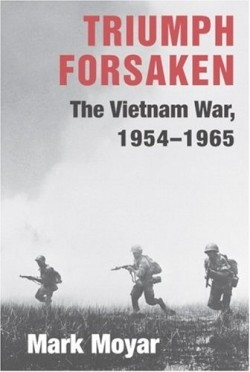Triumph Forsaken
The Vietnam War 1954-1965
“The worst mistake we ever made was getting rid of Diem,” lamented President Lyndon Johnson in 1965, a year and a half after the South Vietnamese President was murdered in a coup backed by the United States. Diem, as presented in most of the highly regarded narratives of the Vietnam War, including those of Stanley Karnow, David Halberstam, Fredrik Logevall, and many others, was a corrupt demagogue who brutalized the South Vietnamese people and was uncooperative with his American benefactors. Not so, says the author in this impressive and scrupulously researched revisionist history.
Moyar holds a Ph.D. in history from Cambridge University, is the author of Phoenix and the Birds of Prey: The CIA’s Secret Campaign to Destroy the Vietcong, and is currently Course Director at the U.S. Marine Corps University in Quantico, Virginia. This is the first of a two-volume reinterpretation of the war and it concludes with Johnson’s 1965 decision to deploy ground troops to help bolster the South Vietnamese military, weakened by a series of coups and the inept leaders who followed Diem.
The Diem the author reveals is a patriot whose successful land reforms and tough anti-communism earned him the support of the South Vietnamese peasants and the grudging respect of the North Vietnamese military leaders. Although he was tolerant by Vietnamese standards, he was hated by Ambassador to South Vietnam Henry Cabot Lodge, the powerful Buddhist faction, and such reporters as Halberstam and Neil Sheehan, because of his perceived ruthlessness. The author faults the arrogant Lodge for Diem’s downfall and for promoting an American-style democracy for a culture that never experienced it. Although Diem did have some strong supporters—Secretary of Defense Robert McNamara, Ambassador Maxwell Taylor, and several American generals—they could not overcome Lodge’s manipulations, which led to Diem’s murder in November 1963.
Moyar includes a fascinating and differing view of the Buddhist group, which has been depicted as a pacifist movement whose members were willing to set themselves on fire to protest inhumane conditions. The Buddhists, the author claims, were often Communist operatives who protested for Diem’s removal and to preserve their favored status. When Lyndon Johnson became president, weeks after the coup, he made his 1964 re-election, rather than the war, his top priority. The author concludes that if Diem were not deposed, the South Vietnamese Army, with only American air support, could have defeated North Vietnam.
Moyar’s controversial investigation will be challenged by many of the well-respected scholars he confronts in his authoritative account, which elevates the arguments of Vietnam War revisionists to a higher, more respected, level.
Disclosure: This article is not an endorsement, but a review. The publisher of this book provided free copies of the book to have their book reviewed by a professional reviewer. No fee was paid by the publisher for this review. Foreword Reviews only recommends books that we love. Foreword Magazine, Inc. is disclosing this in accordance with the Federal Trade Commission’s 16 CFR, Part 255.

